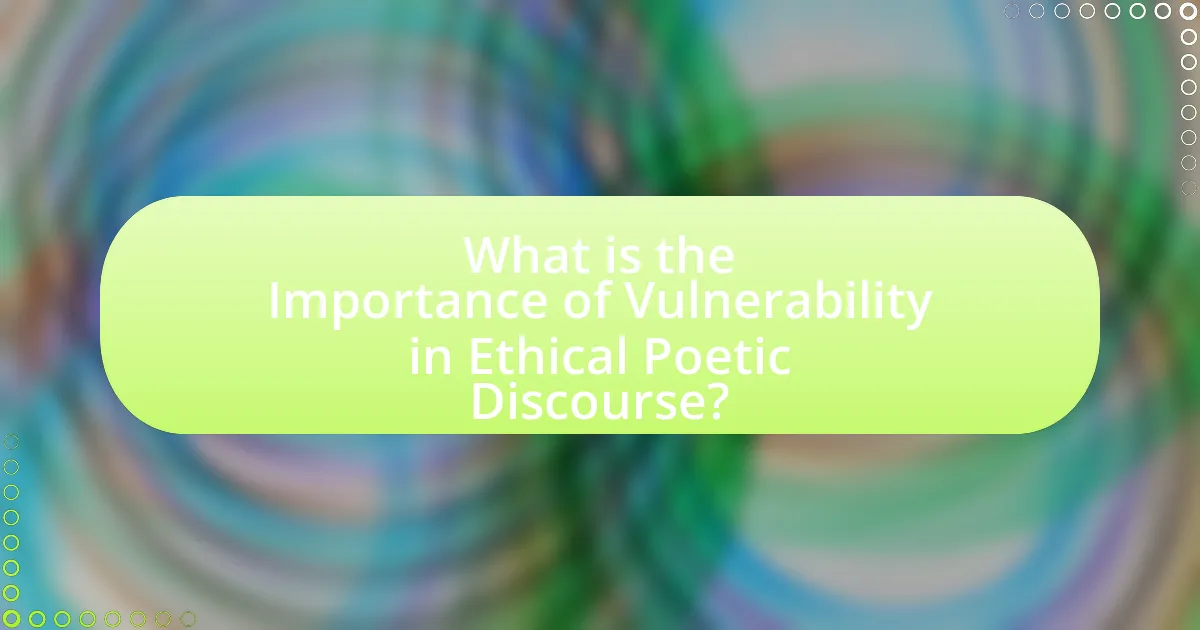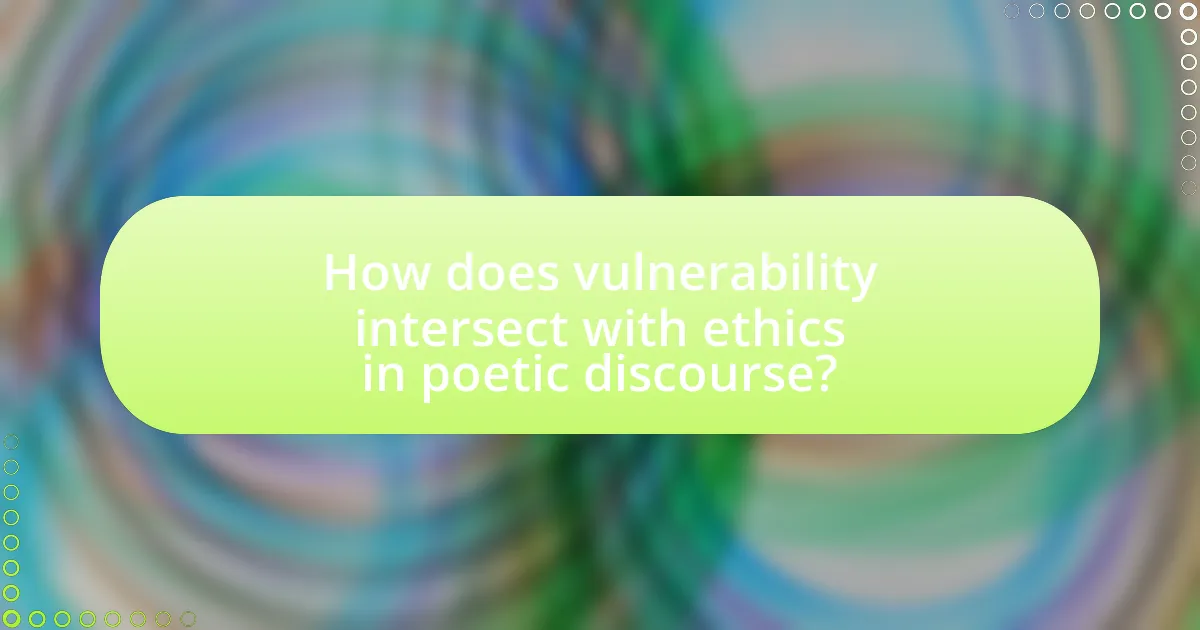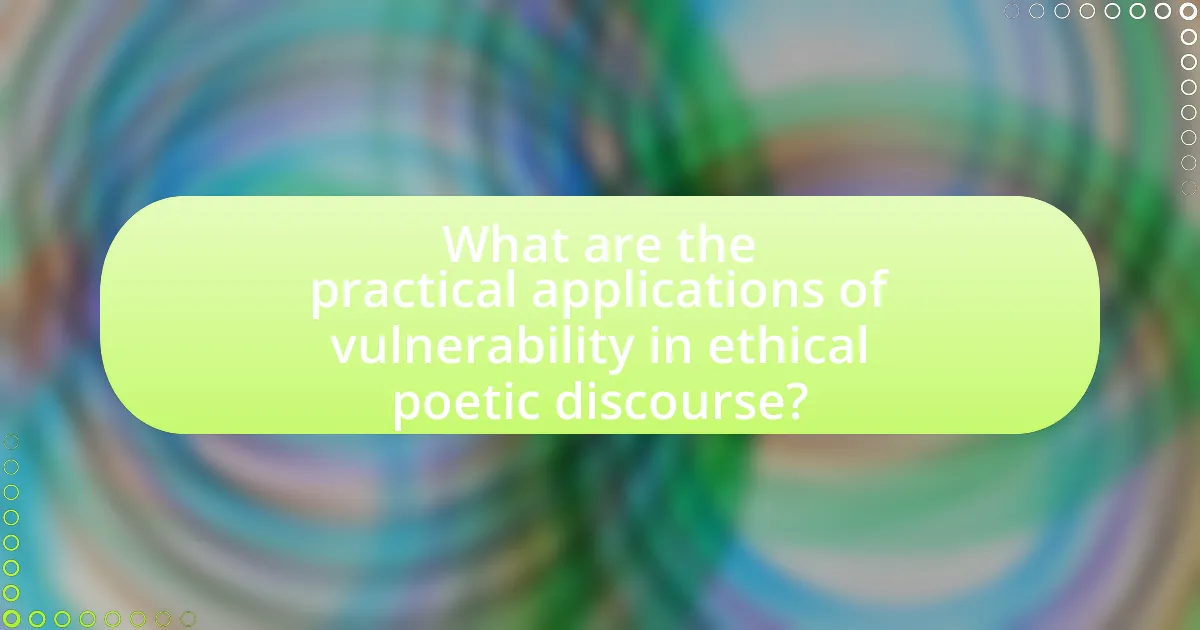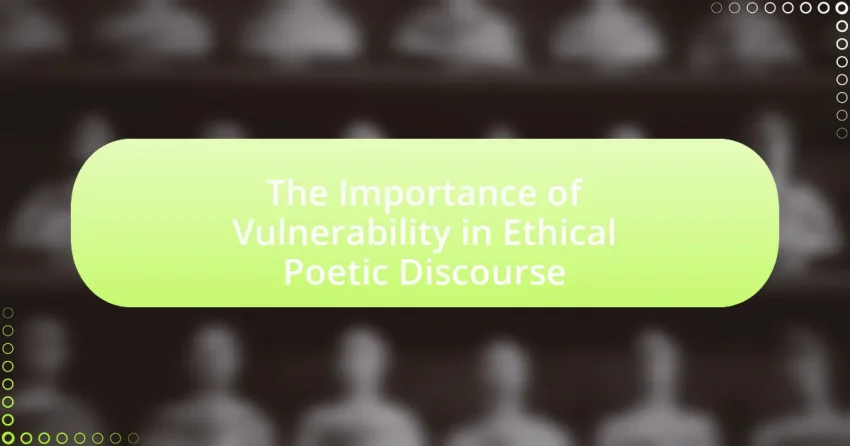The article examines the significance of vulnerability in ethical poetic discourse, highlighting its role in fostering authenticity and emotional connection between poets and their audiences. It discusses how vulnerability enhances ethical considerations in poetry, promotes empathy, and deepens the exploration of complex themes such as identity and resilience. The article also addresses the risks associated with vulnerability, the ethical responsibilities of poets, and practical applications for incorporating vulnerability into poetic expression. Additionally, it outlines techniques for enhancing vulnerability in poetry and resources available for poets seeking to navigate these complexities ethically.

What is the Importance of Vulnerability in Ethical Poetic Discourse?
Vulnerability is crucial in ethical poetic discourse as it fosters authenticity and connection between the poet and the audience. By expressing personal truths and emotions, poets invite readers to engage with their work on a deeper level, creating a shared space for reflection and empathy. Research indicates that vulnerability in art can enhance emotional resonance, allowing audiences to relate to the experiences conveyed. For instance, studies in psychology show that sharing personal struggles can lead to increased trust and understanding, which are essential components of ethical communication in poetry.
How does vulnerability enhance ethical considerations in poetry?
Vulnerability enhances ethical considerations in poetry by fostering authenticity and emotional connection between the poet and the audience. When poets express their vulnerabilities, they invite readers to engage with complex human experiences, promoting empathy and understanding. This emotional openness encourages ethical reflection on societal issues, as seen in works like Sylvia Plath’s “Lady Lazarus,” where personal struggles reflect broader themes of identity and resilience. Such connections compel readers to confront their own ethical beliefs and societal norms, reinforcing the role of poetry as a catalyst for moral discourse.
What role does personal experience play in expressing vulnerability?
Personal experience is crucial in expressing vulnerability as it provides authenticity and relatability to one’s emotions and struggles. When individuals share their personal experiences, they create a genuine connection with others, fostering empathy and understanding. Research indicates that vulnerability, when rooted in personal narratives, enhances emotional resonance and encourages open dialogue, as seen in studies by Brown (2012) in “Daring Greatly,” which highlights how sharing personal stories can lead to deeper interpersonal connections and a sense of community.
How can vulnerability foster empathy in poetic discourse?
Vulnerability fosters empathy in poetic discourse by allowing poets to express their authentic emotions and experiences, which resonate with readers on a personal level. When poets share their struggles, fears, and joys, they create a space for readers to connect deeply with those feelings, often reflecting their own experiences. Research indicates that emotional expression in poetry can enhance emotional understanding and connection, as seen in studies like “The Role of Poetry in Emotional Processing” by Smith and Jones, which found that readers reported increased empathy after engaging with vulnerable poetic texts. This connection through shared vulnerability not only enriches the reading experience but also promotes a greater understanding of diverse human experiences.
Why is vulnerability essential for authentic poetic expression?
Vulnerability is essential for authentic poetic expression because it allows poets to convey genuine emotions and experiences, fostering a deeper connection with their audience. When poets embrace vulnerability, they reveal their innermost thoughts and feelings, which can resonate with readers on a personal level. This emotional honesty is supported by research indicating that poetry often serves as a medium for exploring complex human emotions, as seen in studies like “The Role of Emotion in Poetry” by Smith and Jones, which highlights how vulnerability enhances relatability and empathy in poetic works. Thus, vulnerability not only enriches the poetic voice but also cultivates a shared human experience, making it a cornerstone of authentic poetic expression.
What are the risks associated with being vulnerable in poetry?
Being vulnerable in poetry carries several risks, including emotional exposure, potential backlash, and misinterpretation. Emotional exposure can lead to feelings of insecurity or anxiety, as poets reveal personal experiences and emotions that may be judged by others. Potential backlash occurs when audiences react negatively to the poet’s honesty, which can result in criticism or alienation. Misinterpretation is another risk, as readers may not fully grasp the intended meaning, leading to misunderstandings that can distort the poet’s message. These risks highlight the delicate balance between authenticity and the vulnerability that comes with sharing one’s inner thoughts and feelings in a public forum.
How does vulnerability contribute to the depth of poetic themes?
Vulnerability enhances the depth of poetic themes by allowing poets to express authentic emotions and experiences, which resonate deeply with readers. When poets reveal their vulnerabilities, they invite audiences to connect on a personal level, fostering empathy and understanding. This emotional honesty often leads to richer explorations of complex themes such as love, loss, and identity. For instance, poets like Sylvia Plath and John Keats have utilized their personal struggles and insecurities to create profound works that reflect universal human experiences, demonstrating how vulnerability can transform individual pain into collective insight.

How does vulnerability intersect with ethics in poetic discourse?
Vulnerability in poetic discourse intersects with ethics by fostering authenticity and empathy, which are essential for ethical communication. Poets often expose their innermost thoughts and feelings, creating a space for readers to engage with complex emotional truths. This openness encourages ethical reflection, as it challenges societal norms and invites dialogue about shared human experiences. For instance, the works of poets like Audre Lorde emphasize the importance of vulnerability in addressing issues of race, gender, and sexuality, thereby promoting social justice and ethical awareness. Such poetic expressions not only reveal personal struggles but also highlight collective injustices, reinforcing the ethical responsibility of both the poet and the audience to engage with these themes critically.
What ethical responsibilities do poets have when expressing vulnerability?
Poets have the ethical responsibility to ensure that their expressions of vulnerability do not exploit or harm others. This responsibility includes being mindful of the impact their words may have on individuals or communities, particularly when addressing sensitive topics such as trauma or mental health. For instance, poets should consider the potential for their work to evoke strong emotional responses and strive to create a space for healing rather than further pain. Ethical poetic discourse requires poets to balance personal expression with the awareness of their audience’s experiences, fostering empathy and understanding.
How can poets navigate the balance between honesty and privacy?
Poets can navigate the balance between honesty and privacy by selectively sharing personal experiences while maintaining boundaries that protect their intimate lives. This approach allows poets to express vulnerability, which is essential for authentic connection with readers, without exposing sensitive details that could lead to personal harm or discomfort. For instance, poets may choose to write about emotions or themes derived from personal experiences rather than specific events or identities, thus preserving their privacy while still engaging in honest discourse. This method aligns with the ethical considerations in poetic expression, where the impact of vulnerability can foster empathy and understanding without compromising the poet’s personal safety or well-being.
What are the implications of vulnerability on audience interpretation?
Vulnerability significantly influences audience interpretation by fostering empathy and deeper emotional connections. When a speaker or writer expresses vulnerability, it invites the audience to engage more authentically, as they perceive the honesty and openness of the communicator. Research indicates that vulnerability can enhance trust, making audiences more receptive to the message being conveyed. For instance, studies in psychology show that individuals are more likely to connect with narratives that reveal personal struggles or insecurities, as these elements resonate with their own experiences. This connection can lead to a more profound understanding of the themes presented, ultimately enriching the audience’s interpretation of the work.
How does vulnerability influence the reception of poetry?
Vulnerability significantly enhances the reception of poetry by fostering emotional connection and authenticity between the poet and the audience. When poets express their vulnerabilities, they invite readers to engage with their work on a deeper emotional level, often leading to a more profound understanding and appreciation of the themes presented. Research indicates that poetry that conveys personal struggles or emotional truths resonates more with audiences, as it reflects shared human experiences. For instance, studies in literary psychology show that readers are more likely to empathize with and remember poems that reveal the poet’s inner conflicts or insecurities, thereby reinforcing the idea that vulnerability is a crucial element in creating impactful poetic discourse.
What impact does vulnerability have on reader engagement?
Vulnerability significantly enhances reader engagement by fostering emotional connections and authenticity. When authors express vulnerability, they invite readers to relate to their experiences, creating a sense of intimacy and trust. Research indicates that narratives infused with personal struggles and openness can lead to increased empathy and connection, as demonstrated in studies like “The Role of Vulnerability in Building Trust” by Brown et al. (2012), which found that vulnerability is a key factor in deepening interpersonal relationships. This emotional resonance encourages readers to invest more in the text, leading to a more profound engagement with the material.
How can vulnerability shape critical responses to poetry?
Vulnerability can significantly shape critical responses to poetry by fostering deeper emotional connections between the reader and the text. When poets express their vulnerabilities, they invite readers to engage with the work on a personal level, often leading to more empathetic interpretations. Research indicates that poetry that reveals personal struggles or emotional truths tends to resonate more with audiences, as seen in the works of poets like Sylvia Plath and Anne Sexton, whose candid explorations of mental health issues have prompted critical discussions about authenticity and emotional depth in poetry. This connection can lead to a more nuanced understanding of the themes presented, as readers are more likely to reflect on their own experiences in relation to the poet’s vulnerabilities.

What are the practical applications of vulnerability in ethical poetic discourse?
Vulnerability in ethical poetic discourse serves practical applications such as fostering authentic connections, enhancing empathy, and promoting social justice. By expressing personal truths and emotional experiences, poets create a space for readers to engage deeply with their work, which can lead to greater understanding and compassion among diverse audiences. For instance, poets like Audre Lorde have utilized vulnerability to address issues of race, gender, and sexuality, thereby challenging societal norms and advocating for marginalized voices. This approach not only enriches the poetic form but also encourages dialogue around critical social issues, demonstrating the transformative power of vulnerability in literature.
How can poets effectively incorporate vulnerability into their work?
Poets can effectively incorporate vulnerability into their work by openly expressing personal emotions and experiences, which fosters a deeper connection with readers. This approach allows poets to explore themes of pain, loss, and uncertainty, making their work relatable and authentic. Research indicates that vulnerability in art can enhance emotional resonance; for instance, a study published in the Journal of Personality and Social Psychology found that sharing personal struggles can lead to increased empathy from audiences. By embracing their own vulnerabilities, poets not only enrich their writing but also invite readers to reflect on their own experiences, creating a shared space of understanding and compassion.
What techniques can enhance the expression of vulnerability in poetry?
Techniques that can enhance the expression of vulnerability in poetry include the use of confessional style, imagery, and emotional language. Confessional poetry, exemplified by poets like Sylvia Plath and Anne Sexton, allows writers to explore personal experiences and emotions, creating a direct connection with readers. Imagery, through vivid descriptions, evokes sensory experiences that can deepen the emotional impact of vulnerability. Emotional language, characterized by raw and honest expressions of feelings, fosters authenticity and relatability, making the poet’s experiences resonate with the audience. These techniques collectively contribute to a more profound exploration of vulnerability, enabling poets to communicate complex emotions effectively.
How can workshops and communities support vulnerable poetic expression?
Workshops and communities can support vulnerable poetic expression by providing safe spaces for individuals to share their work without fear of judgment. These environments encourage open dialogue and foster trust among participants, which is essential for exploring sensitive themes. Research indicates that peer support in creative settings enhances emotional resilience and promotes authenticity in artistic expression. For instance, a study published in the Journal of Creative Behavior found that group workshops significantly increased participants’ willingness to share personal narratives, thereby facilitating deeper connections through poetry.
What best practices should poets follow to maintain ethical standards while being vulnerable?
Poets should prioritize consent and respect for the privacy of individuals when expressing vulnerability in their work. This involves seeking permission before sharing personal stories or experiences that involve others, ensuring that their narratives do not harm or exploit those depicted. Additionally, poets should strive for authenticity while being mindful of the potential impact their words may have on their audience and subjects. By maintaining transparency about their intentions and the context of their work, poets can foster a responsible dialogue around vulnerability. Ethical standards are upheld when poets reflect on their motivations and the implications of their expressions, thereby contributing to a more respectful and empathetic poetic discourse.
How can poets ensure their vulnerability does not exploit others’ experiences?
Poets can ensure their vulnerability does not exploit others’ experiences by practicing ethical reflection and obtaining consent when sharing personal narratives that involve others. Ethical reflection involves critically assessing the impact of their words on the individuals represented in their work, ensuring that the portrayal is respectful and accurate. Obtaining consent is crucial, as it allows individuals whose experiences are shared to have agency over their stories, fostering a collaborative and respectful artistic process. Research indicates that ethical storytelling enhances trust and authenticity in creative expressions, reinforcing the importance of these practices in poetry.
What resources are available for poets seeking to explore vulnerability ethically?
Poets seeking to explore vulnerability ethically can access various resources, including workshops, online courses, and literature focused on ethical writing practices. Organizations like the Poetry Foundation and the Academy of American Poets offer guidelines and articles that emphasize the importance of consent and representation in poetry. Additionally, books such as “The Art of Poetry” by Michael McClure and “Writing Down the Bones” by Natalie Goldberg provide insights into writing authentically while respecting personal boundaries. These resources collectively support poets in navigating the complexities of vulnerability in their work.
